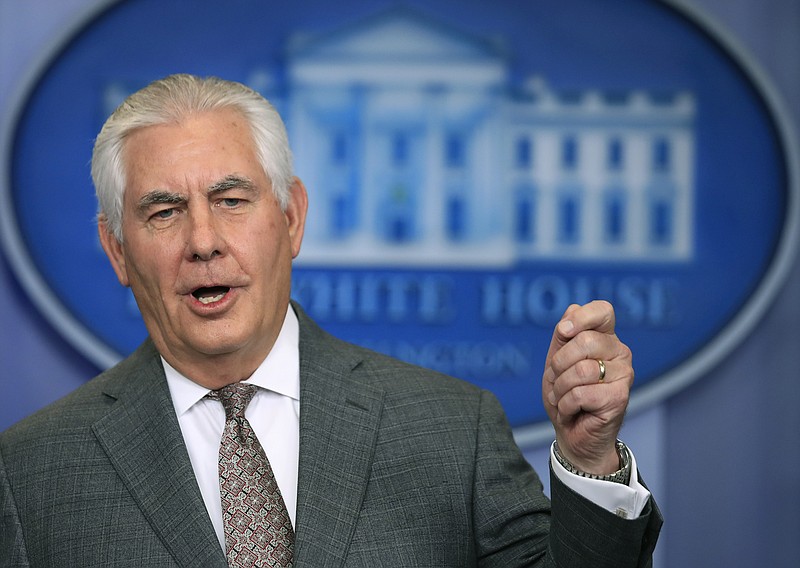WASHINGTON - A funny thing happened to Secretary of State Rex Tillerson on the way to the exit door: He didn't leave. He may be "Dead Man Walking," as many Washington analysts assume. Yet he's still pursuing the same list of quiet but mostly correct diplomatic goals as when took the job 10 months ago.
Tillerson has had a catastrophically bad encounter with official Washington. The White House disdains him; the State Department resents him; the press corps mostly scorns him. Tillerson presses on as if he doesn't care. Many officials claim they don't give a damn about "inside the Beltway" opinion; Tillerson seems to mean it.
The latest instance of Tillerson clashing with his subordinates, according to Reuters, was a dissent memo from about a dozen foreign-service officers accusing him of giving Iraq, Myanmar and Afghanistan a pass on a federal law opposing the use of child soldiers. That's just one example of internal criticism from the unhappiest State Department I've seen in more than 30 years of covering Foggy Bottom.
Tillerson often seems out of sync with President Trump on major issues including North Korea, Iran, Saudi Arabia, Qatar and Lebanon. And White House insiders have been predicting for months that this marriage can't last. Yet it not only continues, but on many areas of supposed disagreement, Trump has ended up adopting, more or less, the diplomatic course that Tillerson recommended.
Tillerson has one secret survival weapon: He's running a three-legged race, figuratively speaking, alongside Secretary of Defense Jim Mattis, who respects Tillerson's judgment and stays aligned with him through all the palace intrigue.
Two policy areas where Tillerson's approach seems to have the president's support, despite noise to the contrary, are dialogue with China on the North Korea crisis, and cooperation with Russia to stabilize Syria. Administration policy could change at any momen, but the persistence of diplomacy is one of the little noted facets of this most undiplomatic president's first year.
U.S. engagement with China was the centerpiece of Trump's Asia trip this month. But observers overlooked one of Tillerson's signature initiatives: During the Beijing visit, the U.S. continued a high-level, secret dialogue with China about how to secure North Korea's nuclear weapons if the regime implodes.
Tillerson lobbies China to encourage talks with the Kim Jong Un regime, even as the administration keeps escalating pressure. Two more turns of the screw came this week: On Monday, Pyongyang was added to the list of state sponsors of terrorism; on Tuesday, the U.S. applied new sanctions to Chinese and North Korean companies. But Tillerson cautioned that even as the U.S. seeks more pressure points, there's no "silver bullet."
Trump and Tillerson also share the unpopular but probably inescapable view that the U.S. must work with Russia to stabilize Syria. Russia's centrality in the miserable Syrian war was dramatized anew by President Vladimir Putin's meeting Monday with President Bashar Assad, who thanked the Russian leader for "saving our country."
Putin has emerged as a dominant player in Syria, and he wants to play the peacemaker there now, but he doesn't hold all the cards. U.S. allies control big swaths of Syrian territory, and they're the missing pieces of Putin's peace process. Tillerson, working with America's allies, has pushed for a resumption of U.N.-organized peace talks in Geneva. A meeting there is now scheduled for Tuesday, followed by a gathering in Sochi on Dec. 2.
Trump made the Russia connection personal with an hour-long phone call Tuesday with Putin, discussing Syria, Ukraine and North Korea. Trump may get hammered for it, but the conversation was sensible, and it capitalized on Tillerson's patient spadework.
Tillerson is famously a former Boy Scout. He talked in 2014 about the character-building value of suffering in silence, during a "frog-strangler" downpour as a 12-year-old scout. Trump has tested Tillerson's determination and dignity, but at Thanksgiving, the secretary of state is still at the table.
Washington Post Writers Group

